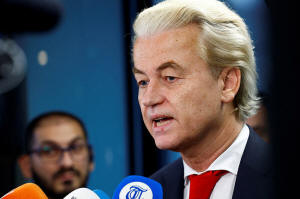|
Talks on a new government went back to square one earlier this
week, almost three months after an election won by Wilders'
nationalist PVV party but short of a majority, after prospective
partner NSC backed out of joining any coalition led by Wilders.
The NSC's decision effectively scuttled the formation of any
rightwing government that would have a majority in parliament.
The Netherlands traditionally is governed by majority coalitions
that nail down their agreements in detailed government pacts.
But the country may have now have to resort to an unconventional
form of government to avert new elections, as too many parties
have said they won't work with Wilders, despite his promises to
drop his most contentious plans - such as shutting down mosques
and banning the Koran from the Netherlands.
"All options are on the table as far as I'm concerned," Wilders
said in a parliamentary debate, adding he still aimed to lead a
new coalition as prime minister. "We are not opting for new
elections, we want to shoulder our responsibilities."
Wilders called for a new intermediary to consult all
parliamentary party leaders in the coming three to four weeks to
hear their preferences, after which a select group could try to
assemble a workable coalition.
Options on the table would include a minority government, or a
more technocratic one in which ministers would not be bound by
strict agreements between parties and would seek shifting
majorities for their policies.
Parties were set to vote on Wilders' proposal later on
Wednesday.
(Reporting by Bart Meijer; editing by Mark Heinrich)
[© 2024 Thomson Reuters. All rights
reserved.]
Copyright 2022 Reuters. All rights reserved. This material may
not be published, broadcast, rewritten or redistributed.
Thompson Reuters is solely responsible for this content.

|
|




